-
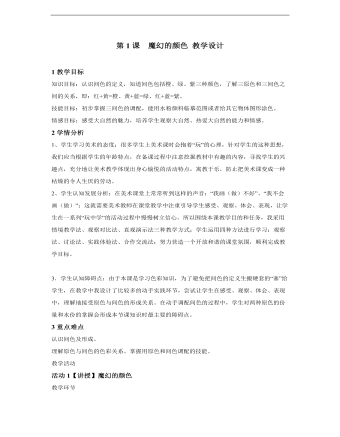
小学美术人教版三年级上册《第1课魔幻的颜色》教学设计说课稿
2学情分析1、学生学习美术的态度:很多学生上美术课时会抱着“玩”的心理,针对学生的这种思想,我们应当根据学生的年龄特点,在备课过程中注意挖掘教材中有趣的内容,寻找学生的兴趣点,充分地让美术教学体现出身心愉悦的活动特点,寓教于乐,防止把美术课变成一种枯燥的令人生厌的劳动。2、学生认知发展分析:在美术课堂上常常听到这样的声音:“我画(做)不好”、“我不会画(做)”;这就需要美术教师在课堂教学中注重引导学生感受、观察、体会、表现,让学生在一系列“玩中学”的活动过程中慢慢树立信心。所以围绕本课教学目的和任务,我采用情境教学法、观察对比法、直观演示法三种教学方式;学生运用四种方法进行学习:观察法、讨论法、实践体验法、合作交流法;努力营造一个开放和谐的课堂氛围,顺利完成教学目标。
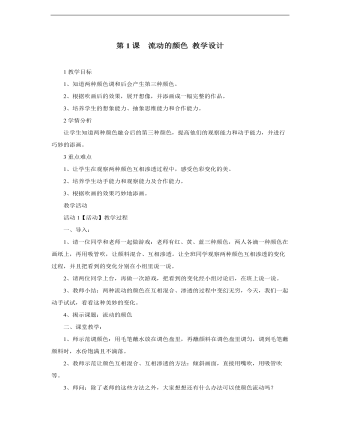
小学美术人教版二年级上册《第1课流动的颜色》教学设计说课稿
一、导入:1、请一位同学和老师一起做游戏:老师有红、黄、蓝三种颜色,两人各滴一种颜色在画纸上,再用吸管吹,让颜料混合、互相渗透。让全班同学观察两种颜色互相渗透的变化过程,并且把看到的变化分别在小组里说一说。2、请两位同学上台,再做一次游戏,把看到的变化经小组讨论后,在班上说一说。3、教师小结:两种流动的颜色在互相混合、渗透的过程中变幻无穷,今天,我们一起动手试试,看看这种美妙的变化。4、揭示课题:流动的颜色
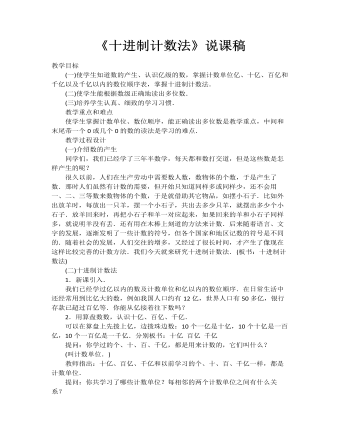
小学数学人教版四年级上册《十进制计数法》说课稿
(二)十进制计数法1.新课引入.我们已经学过亿以内的数及计数单位和亿以内的数位顺序.在日常生活中还经常用到比亿大的数,例如我国人口约有12亿,世界人口有50多亿,银行存款已超过百亿等.你能从亿接着往下数吗?2.用算盘数数,认识十亿、百亿、千亿.可以在算盘上先拨上亿,边拨珠边数:10个一亿是十亿,10个十亿是一百亿,10个一百亿是一千亿.分别板书:十亿 百亿 千亿提问:你学过的个、十、百、千亿,都是用来计数的,它们叫什么?(叫计数单位.)教师指出:十亿、百亿、千亿和以前学习的个、十、百、千亿一样,都是计数单位.
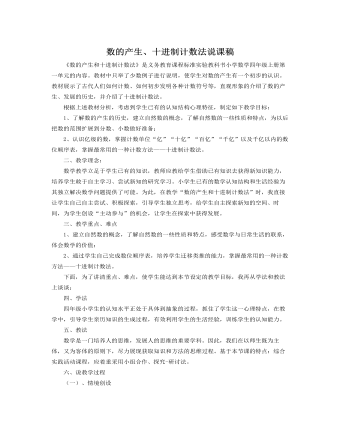
人教版新课标小学数学四年级上册数的产生、十进制计数法说课稿
2、十进制计数法(1)、师提问:“同学们,我们在前几节课已经学习了到万级为止的数,但是,还有比亿更大的数存在着,(出示数位顺序表):引导学生利用已有的知识进行类推,将已学过的亿以内数位顺序表扩展到“千亿”。教师在计数器上现场贴上亿级的数位。(教师向学生说明:还有比千亿更大的数,由于不常用,暂时不学,因此在数为顺序表后面用“…”,表示后面还有其他数位。)(2)、教师提问:“那么,我们已经学习了哪些计数单位呢?”(3)、小组讨论:“每相邻的两个计数单位之间的进率是多少?”请同学们自己得出结论:每相邻的两个计数单位之间的进率都是十。最后,教师给出“十进制计数法”的名称,在黑板上板书。(三)、课堂总结1、教师:“同学们,今天我们一起学习了?”教师请同学们接下去说完整:“自然数和十进制计数法。”
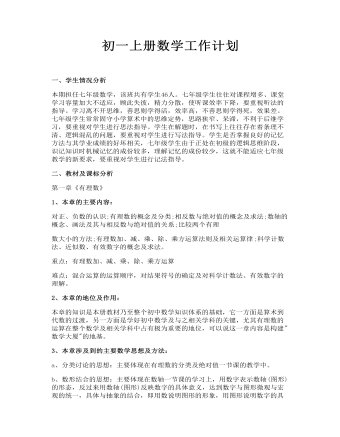
初一上册数学工作计划
第一章《有理数》1、本章的主要内容:对正、负数的认识;有理数的概念及分类;相反数与绝对值的概念及求法;数轴的概念、画法及其与相反数与绝对值的关系;比较两个有理数大小的方法;有理数加、减、乘、除、乘方运算法则及相关运算律;科学计数法、近似数、有效数字的概念及求法。重点:有理数加、减、乘、除、乘方运算难点:混合运算的运算顺序,对结果符号的确定及对科学计数法、有效数字的理解。
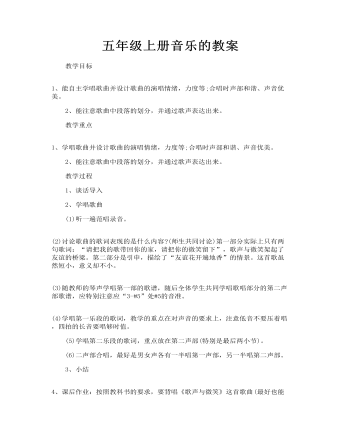
五年级上册音乐的教案
(1)听一遍范唱录音。 (2)讨论歌曲的歌词表现的是什么内容?(师生共同讨论)第一部分实际上只有两句歌词:“请把我的歌带回你的家,请把你的微笑留下”,歌声与微笑架起了友谊的桥梁。第二部分是引申,描绘了“友谊花开遍地香”的情景。这首歌虽然短小,意义却不小。
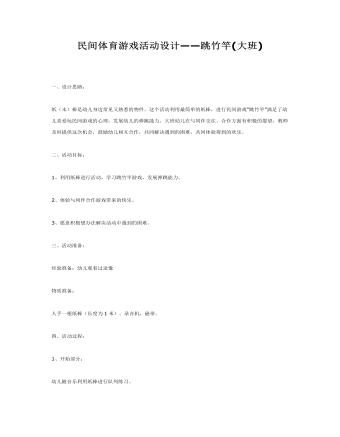
大班体育教案:民间体育游戏活动设计—跳竹竿
二、活动目标:1、利用纸棒进行活动,学习跳竹竿游戏,发展弹跳能力。2、体验与同伴合作游戏带来的快乐。3、愿意积极想办法解决活动中遇到的困难。三、活动准备:经验准备:幼儿观看过录像物质准备:人手一根纸棒(长度为1米)。录音机,磁带。四、活动过程:1、开始部分:幼儿随音乐利用纸棒进行队列练习。导语:今天天气真不错,我们骑着马出去玩玩吧!(幼儿随音乐的变化“骑马”变双圆----大圆----小圆---- “坐马车” )反思:活动开始部分设计了随音乐利用纸棒进行队列练习在这一环节中由两队“骑马”变双圆----变小圆----合作组合“坐马车”体现了动静交替的原则,让幼儿初步尝试了与同伴合作的快乐,同时也为下一个环节奠定了基础。2、基本部分:(1)利用纸棒进行“一棒多玩”导语:纸棒可以和我们玩坐马车的游戏,还可以和我们玩什么游戏呢?我们一起来试试,可以自己玩,也可以和小伙伴一起玩。(幼儿四散游戏)队形:两路纵队(见附图)(2)学习“跳竹竿”游戏A、讲解游戏玩法导语:刚才小朋友用纸棒玩了许多游戏,今天老师要和大家用纸棒玩一个新游戏——跳竹竿,这个游戏可以三个或四个小朋友一起玩,其中两个小朋友手拿竹竿面对面跪下,用竹竿同时分合敲击,另一个小朋友在中间看准竹竿的分合跳进或跳出。大家可以自己选择小伙伴一起试一试。队形:梯形队(见附图)(3)幼儿自由组合尝试玩“跳竹竿”游戏队形:四散(4)对幼儿在游戏过程中出现的情况及时进行指导(合作、交往方面)导语:你刚才和谁一起玩的?你们是怎么跳竹竿的?队形:梯形队(见附图)(5)鼓励幼儿创造性地玩“跳竹竿”游戏,师生共同参与。
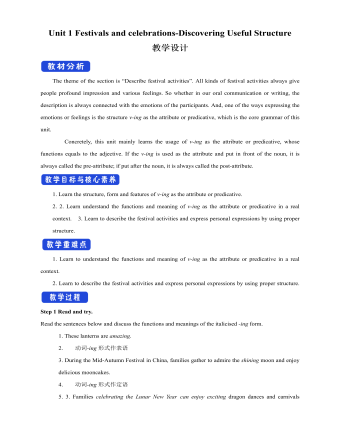
新人教版高中英语必修3Unit 1 Festivals and celebrations-Discovering Useful Structure教学设计
4.That was an experience that frightened everyone. →That was _____________________. 答案:1. taking 2. being discussed 3. in the reading room 4. a frightening experienceStep 6 The meaning and function of V-ing as the predicative动词-ing形式作表语,它通常位于系动词后面,用以说明主语“是什么”或“怎么样”一种表示主语的特质、特征和状态, 其作用相当于形容词; 另一种具体说明主语的内容, 即主语等同于表语, 两者可互换。The music they are playing sounds so exciting. 他们演奏的音乐听起来令人激动。The result is disappointing. 结果令人失望。Our job is playing all kinds of music. 我们的工作就是演奏各种音乐。Seeing is believing. 眼见为实。Step 7 Practice1. It is ________(amaze) that the boy is able to solve the problem so quickly.2. Buying a car is simply _______(waste) money. 3. Please stop making the noise—it’s getting ________(annoy). 4. complete the passage with the appropriate -ing form.La Tomatina is a festival that takes place in the Spanish town Bunol every August. I think many food festivals are __________ because people are just eating. however, this festival is _________ because people don't actually eat the tomatoes. Instead, they throw them at each other! the number of people ________ part in this tomato fight, can reach up to 20,000, and it is a very __________ fight that lasts for a whole hour. The _______ thing is how clean Bunol is after the tomatoes are washed away after the fight. this is because the juice form tomatoes is really good for making surfaces clean!答案:1. amazing 2. wasting 3. annoying4. boring interesting taking exciting amazing
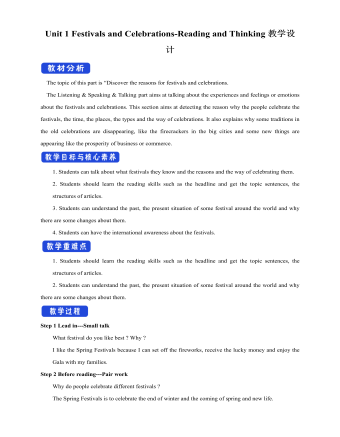
新人教版高中英语必修3Unit 1 Festivals and Celebrations-Reading and Thinking教学设计
The topic of this part is “Discover the reasons for festivals and celebrations.The Listening & Speaking & Talking part aims at talking about the experiences and feelings or emotions about the festivals and celebrations. This section aims at detecting the reason why the people celebrate the festivals, the time, the places, the types and the way of celebrations. It also explains why some traditions in the old celebrations are disappearing, like the firecrackers in the big cities and some new things are appearing like the prosperity of business or commerce. 1. Students can talk about what festivals they know and the reasons and the way of celebrating them.2. Students should learn the reading skills such as the headline and get the topic sentences, the structures of articles.3. Students can understand the past, the present situation of some festival around the world and why there are some changes about them. 4. Students can have the international awareness about the festivals.1. Students should learn the reading skills such as the headline and get the topic sentences, the structures of articles.2. Students can understand the past, the present situation of some festival around the world and why there are some changes about them.Step 1 Lead in---Small talkWhat festival do you like best ? Why ?I like the Spring Festivals because I can set off the fireworks, receive the lucky money and enjoy the Gala with my families.Step 2 Before reading---Pair workWhy do people celebrate different festivals ?The Spring Festivals is to celebrate the end of winter and the coming of spring and new life.The Mid-autumn Day is to celebrate the harvest and admire the moon.
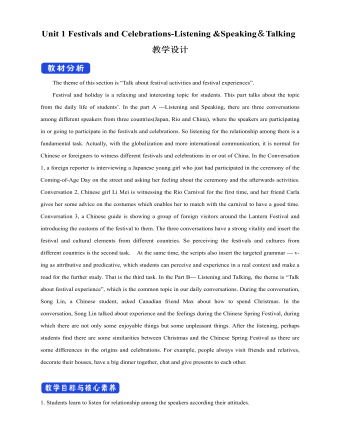
新人教版高中英语必修3Unit 1 Festivals and Celebrations-Listening &Speaking&Talking教学设计
The theme of this section is “Talk about festival activities and festival experiences”.Festival and holiday is a relaxing and interesting topic for students. This part talks about the topic from the daily life of students’. In the part A ---Listening and Speaking, there are three conversations among different speakers from three countries(Japan, Rio and China), where the speakers are participating in or going to participate in the festivals and celebrations. So listening for the relationship among them is a fundamental task. Actually, with the globalization and more international communication, it is normal for Chinese or foreigners to witness different festivals and celebrations in or out of China. In the Conversation 1, a foreign reporter is interviewing a Japanese young girl who just had participated in the ceremony of the Coming-of-Age Day on the street and asking her feeling about the ceremony and the afterwards activities. Conversation 2, Chinese girl Li Mei is witnessing the Rio Carnival for the first time, and her friend Carla gives her some advice on the costumes which enables her to match with the carnival to have a good time. Conversation 3, a Chinese guide is showing a group of foreign visitors around the Lantern Festival and introducing the customs of the festival to them. The three conversations have a strong vitality and insert the festival and cultural elements from different countries. So perceiving the festivals and cultures from different countries is the second task. At the same time, the scripts also insert the targeted grammar --- v-ing as attributive and predicative, which students can perceive and experience in a real context and make a road for the further study. That is the third task. In the Part B--- Listening and Talking, the theme is “Talk about festival experience”, which is the common topic in our daily conversations. During the conversation, Song Lin, a Chinese student, asked Canadian friend Max about how to spend Christmas. In the conversation, Song Lin talked about experience and the feelings during the Chinese Spring Festival, during which there are not only some enjoyable things but some unpleasant things. After the listening, perhaps students find there are some similarities between Christmas and the Chinese Spring Festival as there are some differences in the origins and celebrations. For example, people always visit friends and relatives, decorate their houses, have a big dinner together, chat and give presents to each other.
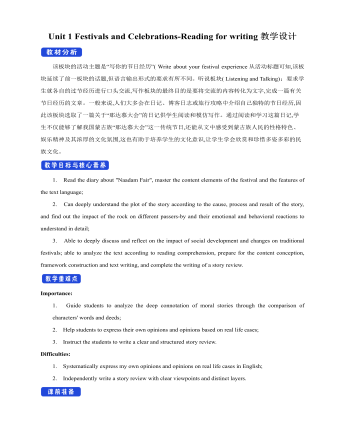
新人教版高中英语必修3Unit 1 Festivals and Celebrations-Reading for writing教学设计二
Step 3 Analyzing article structureActivity 31. Teachers raise questions to guide students to analyze the chapter structure of this diary and think about how to describe the festival experience. (1)What should be included in the opening/body/closing paragraph(s)?(2)How did the writer arrange his/her ideas?(3)What kind of interesting details did the writer describe?(4)How did the writer describe his/her feelings/emotions during the event?2. Students read and compare the three sentence patterns in activity 2. Try to rewrite the first paragraph of the diary with these three sentence patterns. After that, students exchange corrections with their partners. Such as:●This was my first time spending three days experiencing the Naadam Festival in China’s Inner Mongolia Autonomous Region and it was an enjoyable and exciting experience. ●I'll never forget my experience at the Naadam Festival because it was my first time to watch the exciting Mongolian games of horse racing, wrestling, and archery so closely. ●I'll always remember my first experience at the Naadam Festival in China’s Inner Mongolia Autonomous Region because it was so amazing to spend three days witnessing a grand Mongolian ceremony. Step 4 Accumulation of statementsActivity 41. Ask the students to read the diary again. Look for sentences that express feelings and emotions, especially those with the -ing form and the past participle. Such as:● …horse racing, wrestling, and archery, which are all so exciting to watch. ● some amazing performances● I was surprised to see…● I was a little worried about. . . ● feeling really tiredOther emotional statements:●I absolutely enjoyed the archery, too, but the horse races were my favourite part. ●I'm finally back home now, feeling really tired, but celebrating Naadam with my friend was totally worth it. ●He invited me back for the winter to stay in a traditional Mongolian tent and cat hot pot. I can’t wait!2. In addition to the use of the -ing form and the past participle, the teacher should guide the students in the appreciation of these statements, ask them to memorize them, and encourage them to use them reasonably in writing practice.
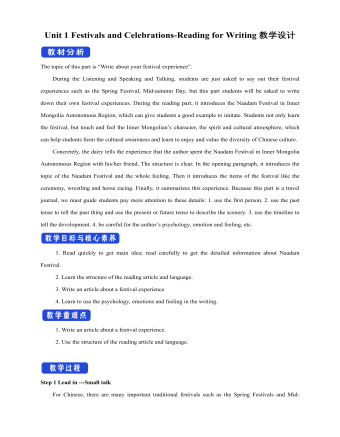
新人教版高中英语必修3Unit 1 Festivals and Celebrations-Reading for Writing教学设计一
The topic of this part is “Write about your festival experience”.During the Listening and Speaking and Talking, students are just asked to say out their festival experiences such as the Spring Festival, Mid-autumn Day, but this part students will be asked to write down their own festival experiences. During the reading part, it introduces the Naadam Festival in Inner Mongolia Autonomous Region, which can give students a good example to imitate. Students not only learn the festival, but touch and feel the Inner Mongolian’s character, the spirit and cultural atmosphere, which can help students form the cultural awareness and learn to enjoy and value the diversity of Chinese culture.Concretely, the dairy tells the experience that the author spent the Naadam Festival in Inner Mongolia Autonomous Region with his/her friend. The structure is clear. In the opening paragraph, it introduces the topic of the Naadam Festival and the whole feeling. Then it introduces the items of the festival like the ceremony, wrestling and horse racing. Finally, it summarizes this experience. Because this part is a travel journal, we must guide students pay more attention to these details: 1. use the first person. 2. use the past tense to tell the past thing and use the present or future tense to describe the scenery. 3. use the timeline to tell the development. 4. be careful for the author’s psychology, emotion and feeling, etc.1. Read quickly to get main idea; read carefully to get the detailed information about Naadam Festival.2. Learn the structure of the reading article and language.3. Write an article about a festival experience4. Learn to use the psychology, emotions and feeling in the writing.1. Write an article about a festival experience.2. Use the structure of the reading article and language.
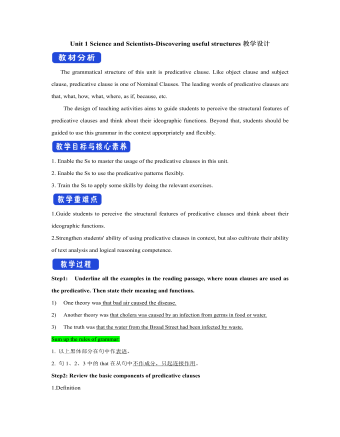
新人教版高中英语选修2Unit 1 Science and Scientists-Discovering useful structures教学设计
The grammatical structure of this unit is predicative clause. Like object clause and subject clause, predicative clause is one of Nominal Clauses. The leading words of predicative clauses are that, what, how, what, where, as if, because, etc.The design of teaching activities aims to guide students to perceive the structural features of predicative clauses and think about their ideographic functions. Beyond that, students should be guided to use this grammar in the context apporpriately and flexibly.1. Enable the Ss to master the usage of the predicative clauses in this unit.2. Enable the Ss to use the predicative patterns flexibly.3. Train the Ss to apply some skills by doing the relevant exercises.1.Guide students to perceive the structural features of predicative clauses and think about their ideographic functions.2.Strengthen students' ability of using predicative clauses in context, but also cultivate their ability of text analysis and logical reasoning competence.Step1: Underline all the examples in the reading passage, where noun clauses are used as the predicative. Then state their meaning and functions.1) One theory was that bad air caused the disease.2) Another theory was that cholera was caused by an infection from germs in food or water.3) The truth was that the water from the Broad Street had been infected by waste.Sum up the rules of grammar:1. 以上黑体部分在句中作表语。2. 句1、2、3中的that在从句中不作成分,只起连接作用。 Step2: Review the basic components of predicative clauses1.Definition
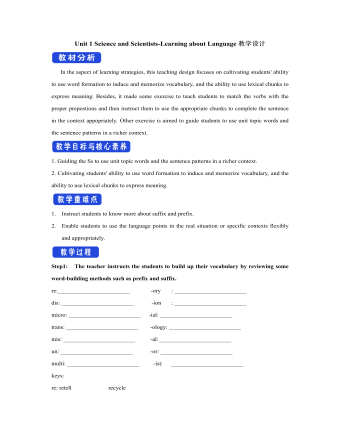
新人教版高中英语选修2Unit 1 Science and Scientists-Learning about Language教学设计
Step 7: complete the discourse according to the grammar rules.Cholera used to be one of the most 1.__________ (fear) diseases in the world. In the early 19th century, _2_________ an outbreak of cholera hit Europe, millions of people died. But neither its cause, 3__________ its cure was understood. A British doctor, John Snow, wanted to solve the problem and he knew that cholera would not be controlled _4_________ its cause was found. In general, there were two contradictory theories 5 __________ explained how cholera spread. The first suggested that bad air caused the disease. The second was that cholera was caused by an _6_________(infect) from germs in food or water. John Snow thought that the second theory was correct but he needed proof. So when another outbreak of cholera hit London in 1854, he began to investigate. Later, with all the evidence he _7_________ (gather), John Snow was able to announce that the pump water carried cholera germs. Therefore, he had the handle of the pump _8_________ (remove) so that it couldn't be used. Through his intervention,the disease was stopped in its tracks. What is more, John Snow found that some companies sold water from the River Thames that __9__________________ (pollute) by raw waste. The people who drank this water were much more likely _10_________ (get) cholera than those who drank pure or boiled water. Through John Snow's efforts, the _11_________ (threaten) of cholera around the world saw a substantial increase. Keys: 1.feared 2.when 3. nor 4.unless 5.that/which 6.infection 7.had gathered 8.removed 9.was polluted 10.to get 11. threat
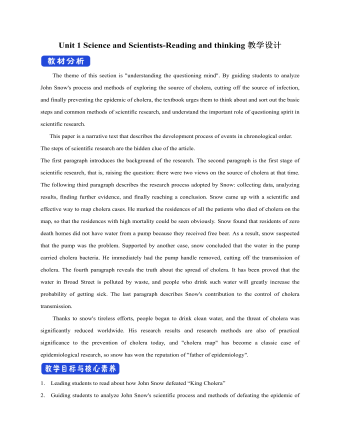
新人教版高中英语选修2Unit 1 Science and Scientists-Reading and thinking教学设计
Step 5: After learning the text, discuss with your peers about the following questions:1.John Snow believed Idea 2 was right. How did he finally prove it?2. Do you think John Snow would have solved this problem without the map?3. Cholera is a 19th century disease. What disease do you think is similar to cholera today?SARS and Covid-19 because they are both deadly and fatally infectious, have an unknown cause and need serious public health care to solve them urgently.keys:1. John Snow finally proved his idea because he found an outbreak that was clearly related to cholera, collected information and was able to tie cases outside the area to the polluted water.2. No. The map helped John Snow organize his ideas. He was able to identify those households that had had many deaths and check their water-drinking habits. He identified those houses that had had no deaths and surveyed their drinking habits. The evidence clearly pointed to the polluted water being the cause.3. SARS and Covid-19 because they are both deadly and fatally infectious, have an unknown cause and need serious public health care to solve them urgently.Step 6: Consolidate what you have learned by filling in the blanks:John Snow was a well-known _1___ in London in the _2__ century. He wanted to find the _3_____ of cholera in order to help people ___4_____ it. In 1854 when a cholera __5__ London, he began to gather information. He ___6__ on a map ___7___ all the dead people had lived and he found that many people who had ___8____ (drink) the dirty water from the __9____ died. So he decided that the polluted water ___10____ cholera. He suggested that the ___11__ of all water supplies should be _12______ and new methods of dealing with ____13___ water be found. Finally, “King Cholera” was __14_____.Keys: 1. doctor 2. 19th 3.cause 4.infected with 5.hit 6.marked 7.where 8.drunk 9.pump 10.carried 11.source 12.examined 13.polluted 14.defeatedHomework: Retell the text after class and preview its language points
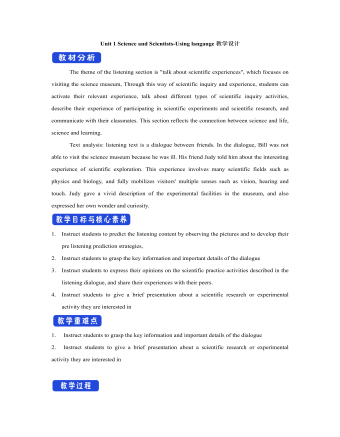
新人教版高中英语选修2Unit 1 Science and Scientists-Using langauge教学设计
This happens because the dish soap molecules have a strong negative charge, and the milk molecules have a strong positive charge. Like magnets, these molecules are attracted to each other, and so they appear to move around on the plate, taking the food coloring with them, making it look like the colors are quickly moving to escape from the soap.Listening text:? Judy: Oh, I'm so sorry that you were ill and couldn't come with us on our field trip. How are you feeling now? Better?? Bill: Much better, thanks. But how was it?? Judy: Wonderful! I especially liked an area of the museum called Light Games.it was really cool. They had a hall of mirrors where I could see myself reflected thousands of times!? Bill: A hall of mirrors can be a lot of fun. What else did they have?? Judy: Well, they had an experiment where we looked at a blue screen for a while, and then suddenly we could see tiny bright lights moving around on it. You'll never guess what those bright lights were!? Bill: Come on, tell me!? Judy: They were our own blood cells. For some reason, our eyes play tricks on us when we look at a blue screen, and we can see our own blood cells moving around like little lights! But there was another thing I liked better. I stood in front of a white light, and it cast different shadows of me in every color of the rainbow!? Bill: Oh, I wish I had been there. Tell me more!? Judy: Well, they had another area for sound. They had a giant piano keyboard that you could use your feet to play. But then, instead of playing the sounds of a piano, it played the voices of classical singers! Then they had a giant dish, and when you spoke into it, it reflected the sound back and made it louder. You could use it to speak in a whisper to someone 17 meters away.? Bill: It all sounds so cool. I wish I could have gone with you? Judy: I know, but we can go together this weekend. I'd love to go there again!? Bill: That sounds like a great idea!
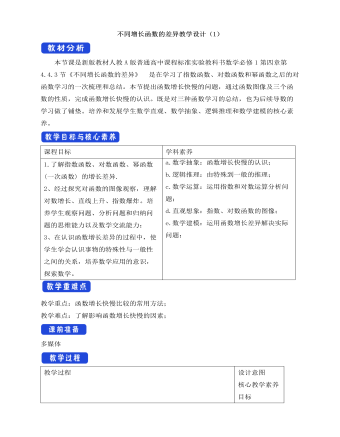
人教A版高中数学必修一不同增长函数的差异教学设计(1)
本节课是新版教材人教A版普通高中课程标准实验教科书数学必修1第四章第4.4.3节《不同增长函数的差异》 是在学习了指数函数、对数函数和幂函数之后的对函数学习的一次梳理和总结。本节提出函数增长快慢的问题,通过函数图像及三个函数的性质,完成函数增长快慢的认识。既是对三种函数学习的总结,也为后续导数的学习做了铺垫。培养和发展学生数学直观、数学抽象、逻辑推理和数学建模的核心素养。1.了解指数函数、对数函数、幂函数 (一次函数) 的增长差异.2、经过探究对函数的图像观察,理解对数增长、直线上升、指数爆炸。培养学生观察问题、分析问题和归纳问题的思维能力以及数学交流能力;3、在认识函数增长差异的过程中,使学生学会认识事物的特殊性与一般性之间的关系,培养数学应用的意识,探索数学。 a.数学抽象:函数增长快慢的认识;b.逻辑推理:由特殊到一般的推理;
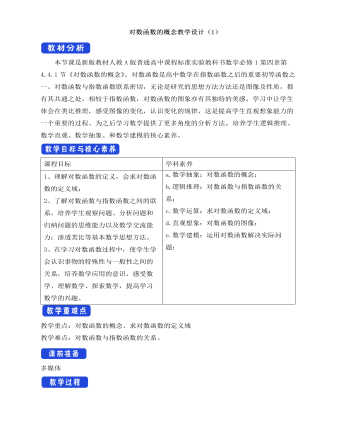
人教A版高中数学必修一对数函数的概念教学设计(1)
本节课是新版教材人教A版普通高中课程标准实验教科书数学必修1第四章第4.4.1节《对数函数的概念》。对数函数是高中数学在指数函数之后的重要初等函数之一。对数函数与指数函数联系密切,无论是研究的思想方法方法还是图像及性质,都有其共通之处。相较于指数函数,对数函数的图象亦有其独特的美感。学习中让学生体会在类比推理,感受图像的变化,认识变化的规律,这是提高学生直观想象能力的一个重要的过程。为之后学习数学提供了更多角度的分析方法。培养学生逻辑推理、数学直观、数学抽象、和数学建模的核心素养。1、理解对数函数的定义,会求对数函数的定义域;2、了解对数函数与指数函数之间的联系,培养学生观察问题、分析问题和归纳问题的思维能力以及数学交流能力;渗透类比等基本数学思想方法。3、在学习对数函数过程中,使学生学会认识事物的特殊性与一般性之间的关系,培养数学应用的意识,感受数学、理解数学、探索数学,提高学习数学的兴趣。
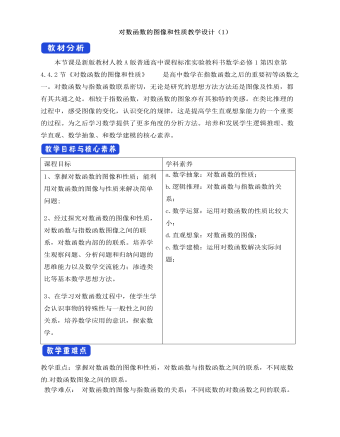
人教A版高中数学必修一对数函数的图像和性质教学设计(1)
本节课是新版教材人教A版普通高中课程标准实验教科书数学必修1第四章第4.4.2节《对数函数的图像和性质》 是高中数学在指数函数之后的重要初等函数之一。对数函数与指数函数联系密切,无论是研究的思想方法方法还是图像及性质,都有其共通之处。相较于指数函数,对数函数的图象亦有其独特的美感。在类比推理的过程中,感受图像的变化,认识变化的规律,这是提高学生直观想象能力的一个重要的过程。为之后学习数学提供了更多角度的分析方法。培养和发展学生逻辑推理、数学直观、数学抽象、和数学建模的核心素养。1、掌握对数函数的图像和性质;能利用对数函数的图像与性质来解决简单问题;2、经过探究对数函数的图像和性质,对数函数与指数函数图像之间的联系,对数函数内部的的联系。培养学生观察问题、分析问题和归纳问题的思维能力以及数学交流能力;渗透类比等基本数学思想方法。
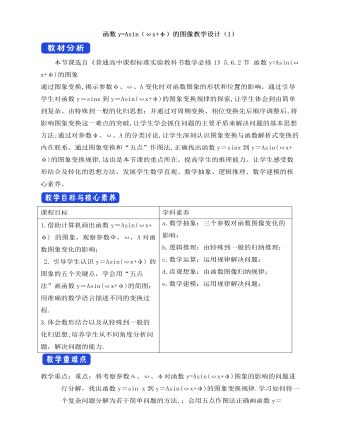
人教A版高中数学必修一函数y=Asin(ωχ+φ)教学设计(1)
本节课选自《普通高中课程标准实验教科书数学必修1》5.6.2节 函数y=Asin(ωx+φ)的图象通过图象变换,揭示参数φ、ω、A变化时对函数图象的形状和位置的影响。通过引导学生对函数y=sinx到y=Asin(ωx+φ)的图象变换规律的探索,让学生体会到由简单到复杂、由特殊到一般的化归思想;并通过对周期变换、相位变换先后顺序调整后,将影响图象变换这一难点的突破,让学生学会抓住问题的主要矛盾来解决问题的基本思想方法;通过对参数φ、ω、A的分类讨论,让学生深刻认识图象变换与函数解析式变换的内在联系。通过图象变换和“五点”作图法,正确找出函数y=sinx到y=Asin(ωx+φ)的图象变换规律,这也是本节课的重点所在。提高学生的推理能力。让学生感受数形结合及转化的思想方法。发展学生数学直观、数学抽象、逻辑推理、数学建模的核心素养。





















